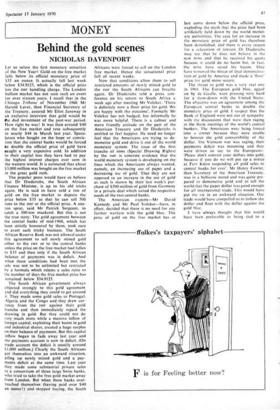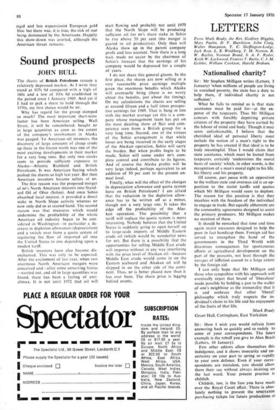MONEY Behind the gold scenes
NICHOLAS DAVENPORT
Let us salute the first monetary sensation of the New Year! Gold on the free market falls below its official monetary price of $35 an ounce. It actually fell last week below $34.9125, which is the official price less the IMF handling charge. The London bullion market has not seen such an event for over sixteen years. I recall that in the Chicago Tribune of November 1968 Mr Harold Lever, then Financial Secretary of the Treasury, assured Mr Eliot Janeway in an exclusive interview that gold would be the dud investment of the post-war period. How right he was! It was then around $40 on the free market and rose subsequently to nearly $44 in March last year. Specu- lators who bought on the hope or convic- tion that the central banks would be forced to double the official price of gold have caught a very expensive cold. In addition to their capital loss they have had -to pay the highest interest charges ever seen in the western world. It is estimated that about $3,000 million was bought on the free market in the great gold rush.
The popular press would have us believe that Dr Diederichs, the South African Finance Minister, is up to his old tricks again. He is said to have sold a ton of gold on the free market to depress the price below $35 so that he can sell 500 tons to the IMF at the official price. A one- ton sprat, said Mr Patrick Sergeant, to catch a 500-ton mackerel. But this is not the true story. The gold agreement between the central banks of mid-1968, which has been strictly honoured by them, took care to avert such tricky business. The South African Reserve Bank was not allowed under this agreement to sell newly mined gold either to the IMF or to the central banks unless the price on the free market had fallen to $35 and then only if the South African balance of payments was in deficit. And when these conditions had been met the sale was not to be unlimited but restricted by a formula which relates a sales ratio to the number of days the free market price has remained below $34.9125.
The South African government always objected strongly to this gold agreement and did everything they could to get around it. They made some gold sales to Portugal, Algeria and the Congo and they drew cur- rency from the IMF against their gold tranche and then immediately repaid the drawing in gold. But they could not do very much more while a massive inflow of foreign capital; exploiting their boom in gold and industrial shares, created a huge surplus on their balance of payments. But this capital inflow began to fade away last year and the payments account is now in deficit. (On trade account the deficit is usually around $1,000 million.) Clearly the South Africans got themselves into an awkward situation, piling up newly mined gold and a pay- ments deficit at the same time. Last year they made some substantial private sales to a consortium of three large Swiss banks, who tried to take the free gold market away from London. But when these banks over- reached themselves (having paid over $40 an ounce!) and stopped buying, the South
Africans were forced to sell on the London free market. Hence the sensational price fall of recent weeks.
Now that conditions allow them to sell restricted amounts of newly mined gold to the IMF. the South Africans can breathe again. Dr Diederichs told a press con- ference on his return to South Africa a week ago after meeting Mr Volcker. 'There is definitely now a floor price for gold. We are happy with the outcome'. Formally Mr Volcker has not budged, but informally he was more helpful. There is a calmer and more friendly attitude on the part of the American Treasury and Dr Diederichs is entitled to feel happier. He need no longer feel that the Americans are trying to de- monetise gold and drive it out of the world monetary system. The issue of the first tranche of SDRS (Special Drawing Rights) by the IMF is concrete evidence that the world monetary system is developing on the lines which the Americans always wanted, namely, an increasing use of paper and a decreasing use of gold. That they are not opposed to an increase in the use of gold as such is shown by their last week's pur- chase of $500 million of gold from Germany in a private deal which suited the respective needs of the two central banks.
The American experts—Mr David Kennedy and Mr Paul Volcker—have, in effect, decided that there is no need for any further warfare with the gold bloc. The price of gold on the free market has at
last come down below the official price, exploding the myth that the price had been artificially held down by the world monet- ary authorities. The case for an increase in the monetary price of gold has therefore been demolished, and there is every reason for a relaxation of tension. Dr Diederichs may say that he does not believe in the new SDRS and that he received his quota because it could do no harm but, in fact, the SDRS have saved his bacon. They have removed the threat of final demonetisa- tion of gold by America and made a 'floor' price: for gold more secure.
The threat to gold was a very real one in 1968. The European gold bloc, egged on by de Gaulle. were pressing very hard for a show-down with the United States. The objective was an agreement among the European central banks to double the monetary price of gold. I suspect that the Bank of England were not out of sympathy with the discussions that were then raging at the Basle meetings of the world's central bankers. The Americans were being forced into a corner because they were unable to honour the gold convertibility of the dollar. The Vietnam war was raging, their payments deficit was mounting and they were driven to say to the Europeans: Please don't convert your dollars into gold, because if you do we will put up a notice at Fort Knox suspending all gold sales to central banks for ever'. Mr Henry Fowler, then Secretary of the American Treasury, was in a bellicose mood and was quite pre- pared to demonetise gold and to tell the world that the paper dollar was good enough for all international trade. This would have put the Inc in an awkward situation. Our trade would have compelled us to follow the dollar and float with the dollar against the gold bloc.
I have always thought that this would have been preferable to being tied to a
ffolkes's taxpayers' alphabet
F is for Feeling better now?
rigid and less expansionist European gold bloc but there was, it is true, the risk of our being dominated by the Americans. Happily this show-down was averted, although the American threat remains.



































 Previous page
Previous page